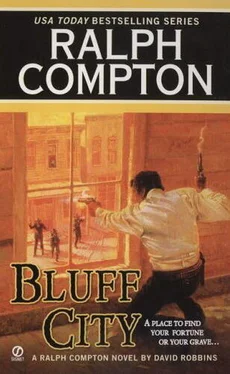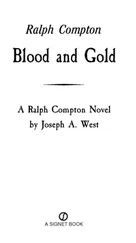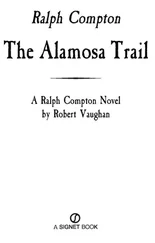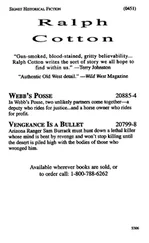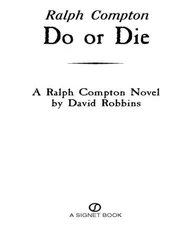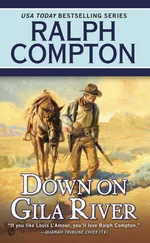“No.”
“Really and truly, I will be fine,” Melanie said. “Give me a rifle if you are worried. I know how to use one.”
When Clay still hesitated, Mr. Train said, “Why don’t I go and come back, and then you go?”
“We’ll do that,” Clay said.
The manhunter drew his Whitney revolver, checked that it was loaded and slid it back into its holster. With a nod he was gone.
“He must expect trouble,” Melanie commented.
“We should all expect it.”
“What makes you say that? Stark and his cutthroats could be anywhere in these mountains.”
“West of us is nothing but wilderness,” Clay said. “A perfect place for Stark to hide out. But we know Stark and his men visit the camps and Bluff City from time to time. Some of them might be in this camp right this minute.”
“Surely not. Not after they raided it and robbed the saloon.”
“Who would stand up to them? The prospectors? They are not gun hands.” Clay shook his head. “And there is no law. The outlaws can come and go as they please, at this camp or any other.”
“At least Stark doesn’t know we are looking for him,” Melanie remarked.
“We want to keep it that way,” Clay said. “We must be careful about the questions we ask. I hope Train remembers that.”
They drank coffee and nibbled on biscuits they had left over from the night before as the shadows lengthened and the air chilled.
“He’s taking an awfully long time,” Melanie commented.
The last of the day faded. A gray mantle shrouded the forest, darkening by gradual degrees.
“Maybe you should go look for him.”
“I won’t leave you alone,” Clay said.
“I am beginning to feel like a wife,” Melanie chided. “I am not helpless, and I wish you would not treat me as if I am.”
Clay set his tin cup on a flat rock and rose. He shucked his Winchester from the saddle scabbard, worked the lever to feed a cartridge into the chamber and held the rifle out to her. “It’s loaded.”
“I saw.” Melanie placed the Winchester across her lap. “If you’re going to be grumpy about it, then stay.”
“I won’t be a minute longer than I have to.” Clay turned and hurried down the hummock. He did not look back.
The camp was the sole oasis of light and noise in a world gone dark and silent. The most noise came from the largest tent. The flap was tied open, and the clink of glasses and the tinkle of chips greeted Clay. To his left a long plank balanced on barrels served as the bar. To his right, poker and faro and roulette were the vices of choice.
Conscious of being stared at, Clay waded through the press of unwashed prospectors to the bar. In his derby and suit he stood out like a well-groomed dog thrust among timber wolves. He ordered a whiskey and, when the barman brought it, he slid a dollar across the plank and said, “I’m looking for someone.”
“There are a lot of someones here.”
Clay described Train.
“Can’t say as I’ve seen him.” The barman pocketed the dollar and went to serve someone else.
Clay swirled the whiskey in his glass, downed it in a gulp, smacked the glass on the plank and was turning to go when a heavy hand fell on his shoulder.
“I couldn’t help but overhear, mister. I know where your friend is.”
The Good Samaritan did not look the part. He had no more flesh on him than a skeleton. His face, his beard and his clothes were dirty. On his large bulb of a nose had sprouted a correspondingly large wart.
“You do?” Clay said.
The Samaritan repeated Clay’s description of Mr. Train. “If that’s the gent you’re looking for, I saw him not an hour ago over at Charlie’s.”
“Who would Charlie be?”
“He has a tent yonder,” the Samaritan said with a vague wave of a dirty hand. “Always has a card game going.”
“He’s a gambler?”
“Not exactly. He just likes cards.” The Samaritan stepped past Clay. “Want me to show you where it is? I was going back there later anyway, so it’s no bother.”
“Sure,” Clay said. But he stayed a few steps behind the man, and when they were outside and at the corner he looked back, but did not see anyone following them.
The Samaritan was a talker. “We don’t see a lot of dandies like you hereabouts. What do you do? Work at a bank or someplace like that? You’re sure as hell not an ore hound.”
“I work at the Courier.”
“What’s that?”
“The Bluff City newspaper.”
“You don’t say?” The Samaritan found that amusing. “You’re a far piece from Bluff City.”
“I’m investigating the Stark gang. Were you here when they helped themselves to the saloon’s money?”
The Samaritan slowed and looked over a shoulder at him. “I might have been. I forget.”
They came to the last of the tents. The canvas had more than a few holes in it and was as filthy as the Samaritan. The Samaritan went right in.
Clay pushed the flap aside but did not enter. A table occupied the center and three men were playing poker. More prospectors, from the look of them.
“This here is Charlie,” the Samaritan said, indicating the filthiest of the players. “The one I was telling you about.” He told Charlie about Clay working for the newspaper.
“I don’t see my friend,” Clay said.
“He was never here.”
“What? Then why did you bring me?”
The Samaritan turned. In his hand was a cocked revolver. “Fact is, boy, you’re as dumb as a stump. But don’t feel bad. You are not the first to fall for it, and you won’t be the last. Now hand over your valuables.”
“And be quick about it,” said the man called Charlie, “or we will kill you and take them anyway.”
Chapter 21
Clay Adams wanted to curse, to fume, to vent a surplus of fury. But not at the men in the tent. He wanted to curse and fume and vent fury at himself for being so damnably gullible. The Samaritan was right; he was as stupid as a tree stump.
Charlie and the other cardplayers rose and unlimbered their hardware. “We’re waiting,” Charlie said, and from behind his back drew a bone-handled hunting knife with a long blade.
Clay thought about the revolver under his jacket. He stared at the four muzzles pointed at him, at the cocked hammers and the curled thumbs, and he did the only thing he could under the circumstances. He tossed his poke to Charlie.
“Well now.” Charlie hefted it and grinned. “Listen to those coins jingle, boys. How much is in here?”
“One hundred and four dollars,” Clay said. “About all I have left to my name.”
“You don’t say,” the Samaritan said. “I reckon this will teach you not to carry so much money around. You never know but when you might be robbed.”
Peals of coarse mirth filled the tent.
Charlie came up and gouged the barrel of his revolver into Clay’s gut. “Here’s how it works, boy. Tell anyone about us, anyone at all, and you die. Tell the law, and when we get our hands on you, you will die as slow as can be and in more pain than anyone has been in since Adam. Believe me. We have done it before, many times. Leave the camp by morning and don’t let us ever catch you here again.”
“You’re letting me live?” Clay blurted, and wanted to beat his head with a rock.
The Samaritan laughed. “Listen to him! He sounds disappointed! Don’t he beat all!”
Charlie laughed, too, and poked Clay with the barrel. “Damn, boy. Do you have any brains in that noggin of yours? Or do you just use it for a hat rack?”
“I’m beginning to wonder,” Clay said.
“You’re a reporter—isn’t that right?” Charlie said. “If we blow out your wick, it could mean more bother than you’re worth. More busybodies will come snooping around. The law, maybe, too. We can do without that. So yes, you go on breathing.”
Читать дальше
